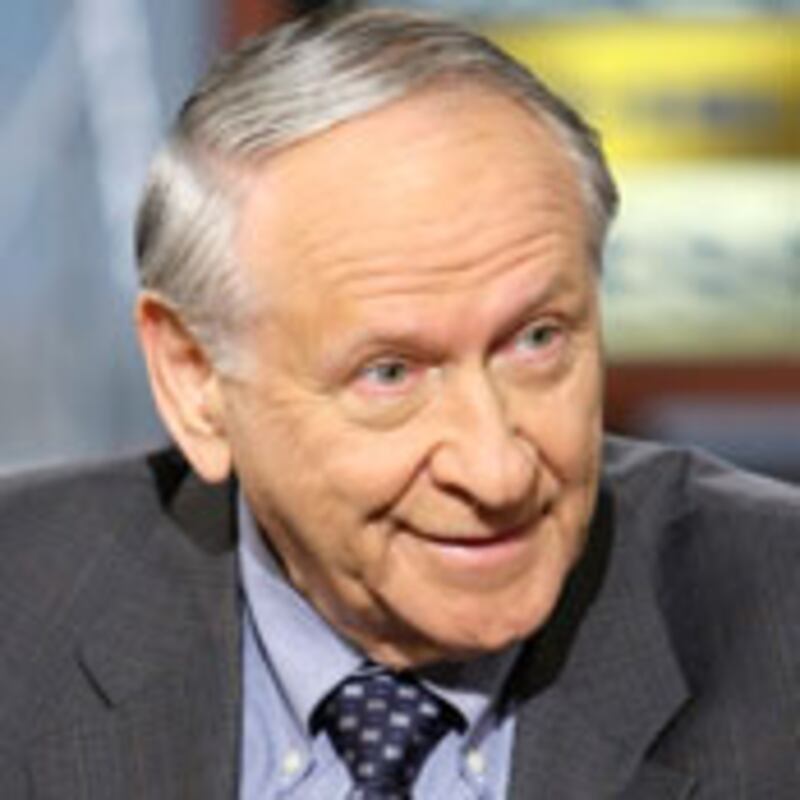
The nation has lost its most independent and thoughtful voice, a man unique in his influence on the American scene for more than four decades.
I speak, of course, of my dear friend Bill Safire, known to the world as a Pulitzer Prize-winning columnist for The New York Times; the high priest—or, as he would say because he hated pretension, the maven—of language usage, author of the definitive dictionary of political language, a lifelong effort; the author of several novels, including a respected historical novel based on the life of Lincoln; a much-sought-after television commentator; and senior aide and speechwriter for President Richard Nixon.
Bill brought a surprising contrarian perspective, grounded in conservatism in the true sense of that word.
To all of these roles Bill brought a surprising contrarian perspective, grounded in conservatism in the true sense of that word. A civil-rights advocate, a staunch defender of the right of privacy and human rights around the world, and an outspoken critic of governmental efforts to infringe upon those rights, Bill was, at the same time, cautious about political and social change and hawkish in his attitude about America’s role, including its military role, in the post-World War II era. He wrote with clarity, insight, and elegance.
This is a man who was at the center of the American dialogue for almost half a century, a position he occupied with grace, dignity, understanding, and a rare and self-deprecating sense of humor.
For me personally, and for a few of the close friends of the same vintage, this moment is not only a terrible personal blow but a clear indication of the end of a wonderful era. Bill and I met in 1947 and have been steadfast friends ever since. In myriad ways, both straightforward and subtle, he proved his loyalty and love for his pals. My own life was irrevocably altered by his faith and confidence.
In 1972, shortly after Nixon’s landslide victory over McGovern, Bill called and asked me to come to Washington to spend some quiet time discussing what he might do if he chose to leave government service. We had lunch at the White House and talked about his life. He had no desire to return to the world of public relations, where he had risen to head his own eponymous firm and to represent many of America’s great corporations. When he left to go to work for President Nixon, he had left me a power of attorney and the unenviable job of selling Safire Public Relations, without Safire. Miraculously, we found a buyer, which helped fund his government service.
I asked him what, if the world was perfect, he would like to do. He replied that he would love to have a newspaper column that would allow him to range over everything that interested him. The second thing he felt would make him professionally content would be to do a book about Nixon, whom he had known well since the Kennedy campaign and through the disastrous race for governor of California, which he had lost to Pat Brown. This would be an important book, Bill felt, because it would involve a senior aide writing about a sitting president.
I thought I could help with the column idea, but I told Bill that since I was a corporate lawyer I knew nothing of publishing and would find him an experienced agent. Bill’s reply, typical of him, was that I was the only lawyer he ever had and since he hadn’t written the book yet, I had time to learn about the business and the agency aspect of it. He rebuffed all of my protests, saying he wanted a friend to represent him.
I studied, he wrote, and the rest is history. The book, ultimately titled Before the Fall, became the subject of an arbitration proceeding when the publisher, William Morrow and Company, attempted to reject it because Watergate and the firing of Haldeman and Ehrlichman had intervened. The alleged reason they gave was the manuscript was “unacceptable.” We won the arbitration, recovering the rights to the book and the advance already paid. Bill ran around Washington telling all of his friends and colleagues about his friend who was his agent. His opinion carried such weight even then that the telephone in my office began to ring with Safire recommends and within two years I abandoned a successful law practice and became an agent full time, a decision I’ve never regretted.
Mine is not an unusual Safire story. Many can testify to how Bill affected their lives, always in the most positive ways.
A week ago, Bill called to tell me that he had pancreatic cancer and that it was inoperable. Ed Bleier, formerly a senior officer of Warner Bros., and Bob Menschel of Goldman Sachs were the other close friends he took into his confidence. We were the four musketeers in those days at Syracuse. This phone conversation with Bill was my last communication with him because he declined very quickly thereafter and didn’t want visitors.
We faced his reality directly in that phone call and I reminded him that if the battle was lost he could look back on a professional career of unparalleled influence over almost two generations and that this was something he could be proud of as a legacy, from a kid at the Bronx High School of Science whose dad had died when he was 8. I also said that he’d be leaving behind a legion of friends and colleagues who would miss him dearly and a family—wife Helene, children Mark and Annabelle, and a grandchild who loved and adored him and to whom he had been a great family man.
There was a long pause when I finished my litany of his accomplishments. I could sense that he was exhausted. More than a minute of silence ensued and then he said the last words I would ever hear from him. He said: “Remember, Mort—I love you.”
Morton Janklow is a senior partner of Janklow and Nesbit Associates who represents among others: David McCullough, Thomas Harris, Danielle Steele, and Michael Moore. He founded the Morton L. Janklow Professorship of Literary and Artistic Property Law at Columbia Law School and the Janklow Program for Arts Leadership at Syracuse University.






